The Joke of Eradicating Online Gambling
The investigation into the Communication and Digital Affairs Ministry employees backing online gambling is expanded to include many people. Ill-gotten gains from a political operation.
maaf email atau password anda salah

The investigation into the Communication and Digital Affairs Ministry employees backing online gambling is expanded to include many people. Ill-gotten gains from a political operation.

The presence of Hashim Djojohadikusumo at COP29 in Azerbaijan was considered as bearing a conflict of interests. He was promoting the business of Arsari Group.
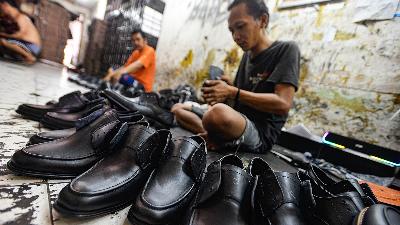
The disbursement of People’s Business Credit faces numerous challenges. Farmers and small business owners are vulnerable to loan sharks and middlemen.
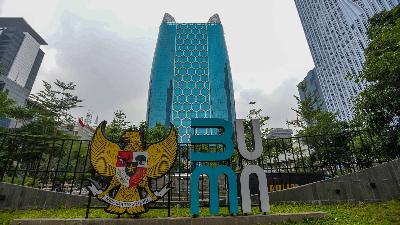
The plan for a super-holding for state-owned enterprises dates back to the New Order era. The SOEs Ministry will be replaced by a giant corporation.

With the Supreme Court’s judicial mafia, when one branch is lopped off, another 10 grow in its place. It needs to be comprehensively cleaned up.

The Supreme Court dismissed three judges suspected of accepting bribes in the Ronald Tannur case. This adversely impacts efforts to improve the judiciary.

Judicial Commission Chair Amzulian Rifai on the corruption in judicial institution involving judges.

Driven by corporate demand, helicopter business opportunities continue to grow. Operators are increasingly expanding their fleets.

There is an increasingly real threat to Indonesia’s biodiversity. It cannot be overcome through empty slogans at international forums.
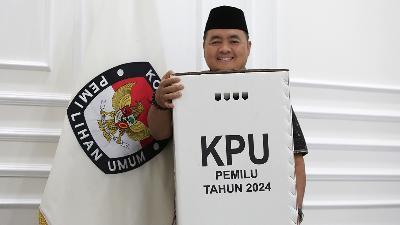
KPU Chair Mochammad Afifuddin on turbulence within his institution following the dismissal of Hasyim Asy’ari, and the Constitutional Court’s decision on the regional head elections.
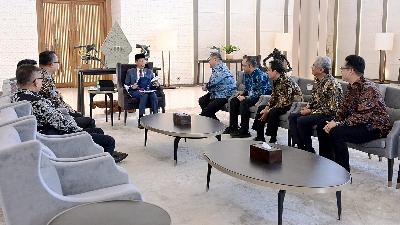
Various parties from the National Police Chief to the State Palace are accused of interfering in the KPK leadership candidates selection process. The candidates are divided into four clusters.

Tempo’s interview with Minister of Communication and Informatics Budi Arie Setiadi about Jokowi’s campaign before the end of his tenure.

As President Jokowi's term neared its end, instructions were given to promote the government's achievements, and billions of rupiah in contracts were offered to the media.
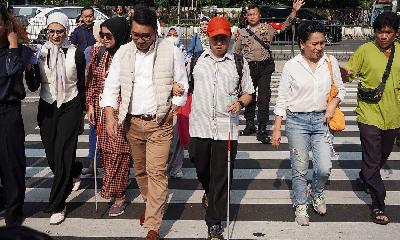
Jakarta governor and deputy governor candidates promise improvements in inclusive public transportation.
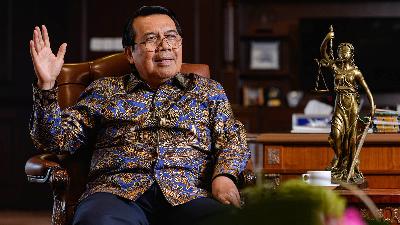
Supreme Court Chief Justice Muhammad Syarifuddin uses artificial intelligence to handle cases. Case brokers continue to be a threat.

Media companies are experiencing upheaval due to the rapid changes in the business landscape. The industry is moving towards a new equilibrium.

Using a variety of pretexts, the political parties replace elected legislative candidates. This is a betrayal of the people’s choice.
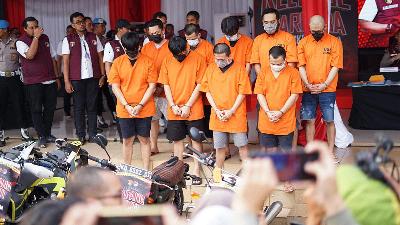
Hendra Sabarudin’s drug network distributed methamphetamine from Tarakan prison starting in 2017, allegedly aided by police and prison guards.

The government plans to dredge 17.6 billion cubic meters of sea sand and sediment, altering the landscape and destroying marine life.
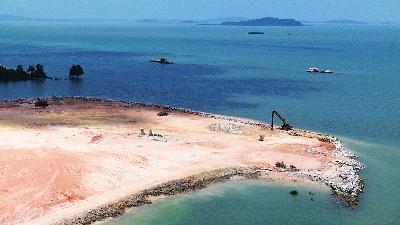
The government designated a number of areas as zones for cleaning sediment and sea sand.

Anindya Bakrie ousts Arsjad Rasjid from the position of General Chair of the Indonesian Chamber of Commerce and Industry (Kadin). The Palace’s support shifted.

Anindya Bakrie ousted Arsjad Rasjid as the Chair of the Indonesian Chamber of Commerce and Industry (Kadin). The organization is becoming like a political party and enjoys large funds coming in from overseas.

Gubernatorial candidates are trying to win over the votes of Anies Baswedan supporters in the Jakarta regional election. Jokowi reportedly shifted his support.

Pramono Anung and Ridwan Kamil shed light on the dynamics surrounding their appointments as Jakarta gubernatorial candidates.

Police uncover baby trafficking syndicate operating in Java-Bali since 2023. Five babies were already sold.
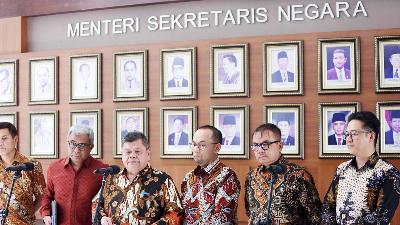
News summary on the conflict of interest of KPK leadership candidates and 44 ministries in Prabowo’s government.
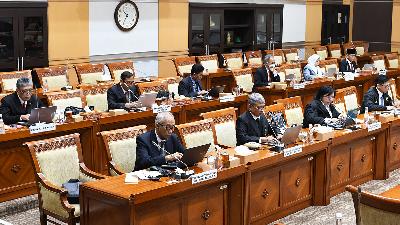
Commission III of the House of Representatives rejected all the Supreme Court judge candidates proposed by the Judicial Commission. The rejection allegedly was due to their favored candidate failed to pass.
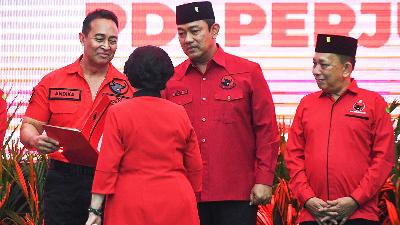
The Indonesian Democratic Party of Struggle (PDIP) strives to counter candidates supported by the Palace. It is an early projection for the 2029 General Elections.
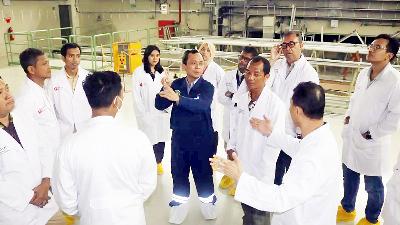
BRIN is designing the Peluit-40 nuclear reactor to replace diesel power plants, claiming it to be safer.
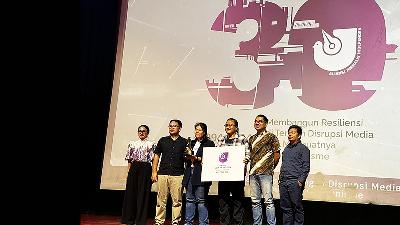
The Bocor Alus Politik podcast receives the Udin Award that we dedicate to our viewers and readers.

An exclusive Tempo interview with Anies Baswedan regarding his chances to run in the Jakarta regional head election.

Jokowi and Prabowo’s coalition are maneuvering to thwart Anies Baswedan’s candidacy in the Jakarta regional head election. Cabinet posts are being offered as inducements.

Tommy Hermawan Lo’s name emerges following the mention of Mr. T in online gambling that involves human trafficking case. He is a director at a casino management company.
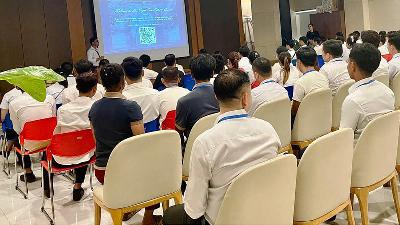
Victims of human trafficking for online gambling and scamming in Cambodia claimed of being forced to work 12-hour shifts and being beaten. Recruitment is still ongoing.

The battle in the presidential election is set to continue in regional head elections. The PDI-P is determined to challenge President Joko Widodo’s candidates.
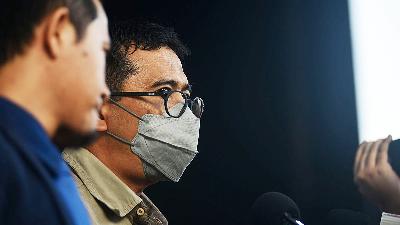
Personal protective equipment corruption suspect, Budi Sylvana, denied inflicting up to Rp300 billion of losses to the state. He revealed the roles of other officials in the case.
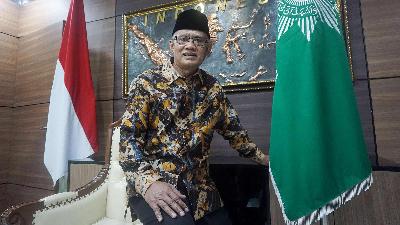
Muhammadiyah follows Nahdlatul Ulama’s step to accept mining concession offer from the government. Muhammadiyah General Chair Haedar Nashir explains about it.
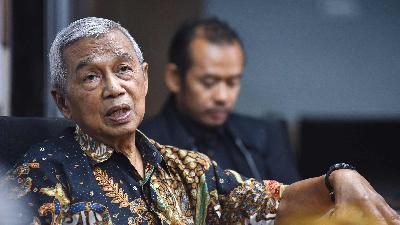
Muhammadiyah accepts the government’s mining concession offer. Many members are against it. Busyro Muqoddas, Chair of Muhammadiyah’s Law and Human Rights Council explains.

Muhammadiyah cadres and administrators are divided in their response to the mining concession. There are whispers from the government and the entrepreneurs.

Retno Marsudi dismissed the idea that the government is merely meddling foreign affairs. She emphasized that Indonesia is a trusted partner on the international stage.
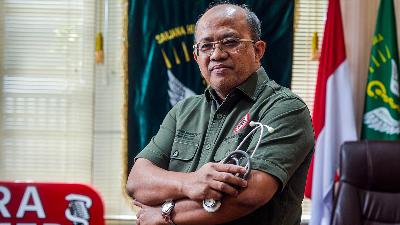
Chair of IDI, Mohammad Adib Khumaidi, discusses the polemic over the plan to allow foreign doctors to practice in Indonesia. He emphasizes stringent regulations are necessary.

Communication and Informatics Minister Budi Arie explains the cyberattack on the Temporary National Data Center. He dismisses allegations of negligence.

Infinite Earth responds regarding the revocation of Rimba Raya Conservation’s ecosystem restoration permit.

There will be a wave of layoffs at Tokopedia as a result of inefficient practices. This is the result of government policy rife with conflicts of interest.

The PDI-P is preparing to replace Hasto Kristiyanto after he was questioned by the KPK in the Harun Masiku case. They are wary of the Palace’s interference.

The founders of GoTo and Tokopedia sold their shares. New investors now have control of ownership.

Tokopedia made significant cuts in its workforce following its business consolidation with TikTok. A consequence of inefficient business operation.

Muhammadiyah’s business networks cover various sectors, from education to financial services. It seeks to create a closed economic ecosystem.

Muhammadiyah withdrew trillions of rupiah from Bank Syariah Indonesia. It was the accumulation of various problems, from operational matters to appointment of commissioners.
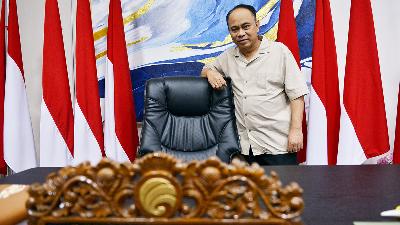
Communication and Informatics Minister Budi Arie Setiadi talks about the polemic over the planned revision of the Broadcasting Law and the Starlink Internet service.

Narendra Modi is likely to serve his third term as the Prime Minister of India. His campaigns are based on populism and religion.

The fintech lending business is increasingly losing steam. Returns continue to decline while fund owners are opting for other investment portfolios.

Tourism and Creative Economy Minister Sandiaga Salahuddin Uno assures that the tourism fee will not be imposed on plane tickets.
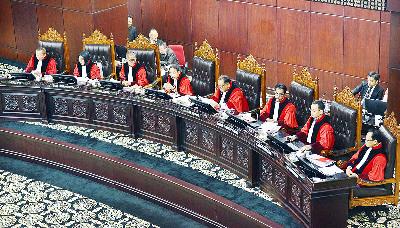
The Constitutional Court rejected lawsuits disputing the results of the 2024 presidential election. The option of disqualifying Gibran was discussed in a meeting of the judges.

Foreign Affairs Minister Retno Marsudi explains the Gaza war and the Iran-Israel conflict with its impact on Indonesia’s economy.
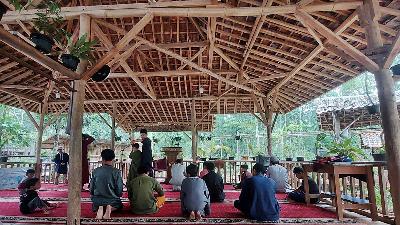
Islamic boarding schools (pesantren) cannot be closed even if they do not have a license from the government. There is no protection from the Ministry of Religious Affairs if legal problems arise.

The Rabithah Alawiyah organization is in charge of recording and preserving the line of descent of the Alawiyyin in Indonesia. Seven books from Yemen serve as their guide.

Several companies are applying for permits to utilize sediment, including sea sand. Large corporations use landfills for land reclamation areas.

Indigenous people are taking legal action against the President and the DPR for delaying deliberations of a bill. It has taken second place to the interests of investors.
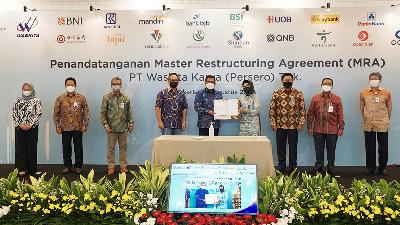
State banks stop distributing loans to state construction companies. Government assignment projects are burdening banks.

The government opens the option of switching energy subsidies for the free lunch program. This threatens poor households.

The government issues a regulation to develop the game industry. There will be a special funding agency.
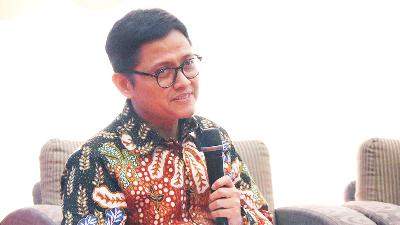
Discussions of the Asset Recovery Draft Law is stagnating in the DPR. It is key to preventing money laundering.

TikTok Shop’s acquisition of Tokopedia changes the Indonesian business map. It is not clear how small and medium enterprises will be protected.
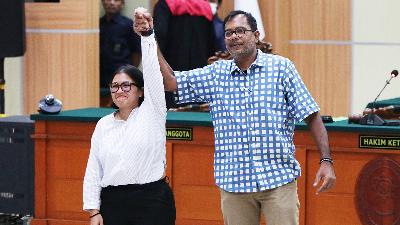
The prosecutor persists in filing a cassation against the acquittal of Haris Azhar and Fatia Maulidiyanti. It is a threat to the freedom of expression.

GoTo CEO Patrick Waluyo reveals the story behind the selling of Tokopedia shares to TikTok. How much profit did GoTo get?

The integration of TikTok Shop with Tokopedia will reinforce GoTo’s business. Indonesia’s e-commerce competition landscape is changing.

The presidential and vice-presidential candidates are relying entirely on gimmicks to exploit the emotions of the people. This moves the campaign away from substantive discussions.

Do the presidential candidates succeed in attracting young voters with social media gimmicks?

Budiman Sudjatmiko persuades other activists to support Prabowo Subianto. He claims he is not motivated by money.
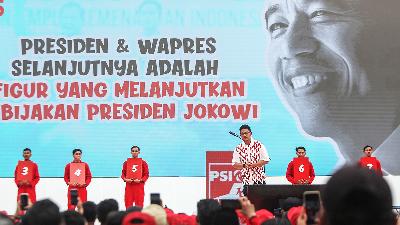
How does the Indonesian Solidarity Party get its funding? Is the aid from conglomerate bosses like Djarum’s owner true?

Presidential Chief of Staff Moeldoko is writing regarding his alleged interference in electric vehicle policy over Wuling’s SNI certification.

Post-Firli Bahuri, the Corruption Eradication Commission (KPK) is still walking backward toward its grave. A radical reform is needed.

The presidential candidates’ campaign teams are an illustration of the type of government they would form if elected. Businesspeople have a central role.
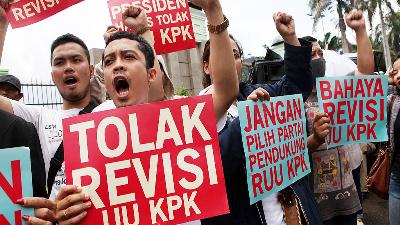
The Corruption Eradication Commission is no longer independent ever since it became part of the executive body. The fruit of the revised KPK Law.
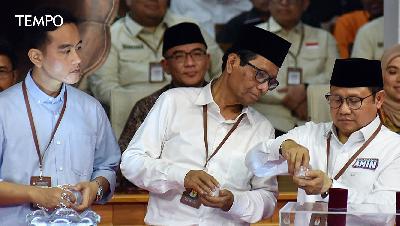
In Indonesia, presidential candidate debates are planned as bogus performances. There is no in-depth discussion of the issues.

Yet again, a member of the Supreme Audit Agency is involved in corruption. The system for selecting these state auditors is very poor.
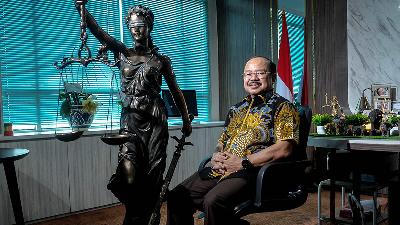
Judicial Commission Chairman Amzulian Rifai explains the boundaries of his authority in dealing with judges, and the Judicial Commission Bill.
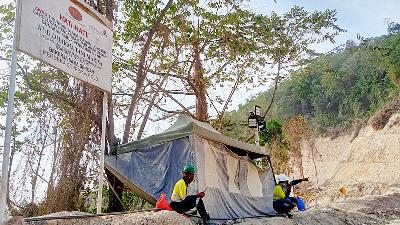
Sandiaga Uno and Garibaldi Thohir’s company is in conflict with local miners. The amount of compensation is considered inadequate.

Having no democratic legitimacy, Gibran Rakabuming Raka must withdraw his candidacy for the vice-presidency.

Tempo's special interview with MKMK Chairman Jimly Asshiddiqie regarding the dismissal of Anwar Usman as Chief Justice of the Constitutional Court.

The program to put coal-fired power plants (PLTU) into early retirement is hampered by funding problems. As grants are stuck, the state budget must be disbursed.

Nepotism is the close relative of corruption and dictatorship. The Indonesian Independence Proclamation places nepotism as a threat to independence.
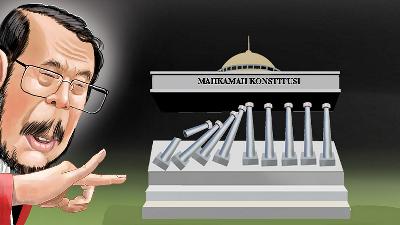
Constitutional Court Chief Justice Anwar Usman is reportedly maneuvering to lower the minimum age limit for presidential and vice-presidential candidates, paving the way for Gibran.
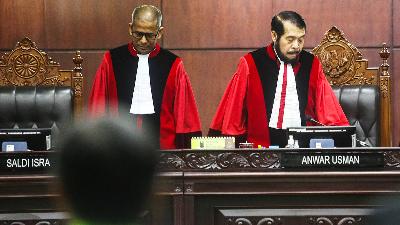
The Constitutional Court reportedly already made a decision in favor of a lawsuit regarding the minimum age requirement for presidential and vice-presidential candidates. The issue is rife with conflicts of interest.

Carbon trading is simply a way to mitigate climate change. The main aims are the energy transition and environmental protection.

The Indonesian Stock Exchange established four carbon trading mechanisms. There were 27 transactions in three schemes in the initial sale.

Presidential candidates’ supporters are creating unfavorable atmosphere in the build-up to the 2024 general elections with them more inclined to speak about rivals’ weaknesses than promoting their champions’ profiles.

The 2024 presidential candidates are competing to garner support from retired generals. This perpetuates the militaristic nature of Indonesian politics.

The plan from the OJK to introduce carbon units as securities could lead to problems. Carbon trading no longer means a reduction in emissions.

The three soldiers who allegedly killed a civilian should be tried in a criminal court. The Military Courts Law needs to be revised.

The OJK regulates carbon exchanges as a securities trading platform. How will the OJK prevent greenwashing in the carbon exchange?

The news in our media is problematic. Why is that?

Voluntary carbon trading has stopped since 2021, due to upside down policies.
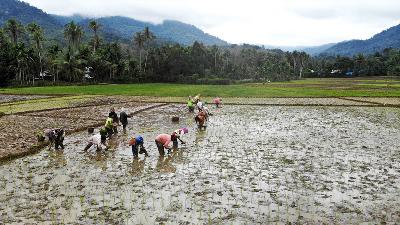
Individuals and companies are already implementing carbon trading in the voluntary market. But no price standard has been set.

News summary, from the dismissal on Budiman Sudjatmiko to Food Estate.
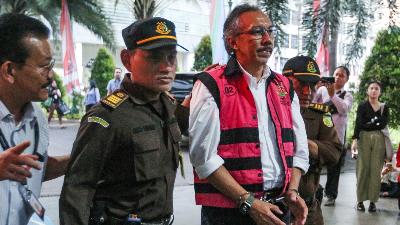
Former Director-General of Mineral and Coal, Ridwan Djamaluddin, is named as suspect in the Mandiodo Block nickel corruption case.

Why did the prominent figures from Papua fail to bring the Papuans to support the Republic of Indonesia?
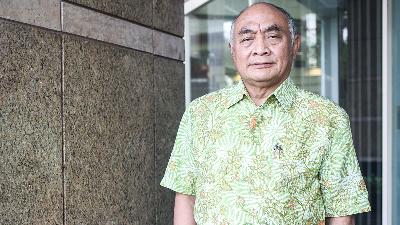
The government faces difficulties accommodating kidney donors and recipients. The need for kidney donors is high, but the supply is very limited.
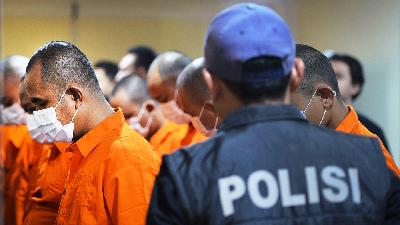
The police exposes Indonesian kidney trafficking network in Cambodia. The victims are enticed through social media.

THE plan of TNI (Indonesian Military) Air Force Chief Marshal Agus Supriatna to officially open the Wiratmo dormitory at Balikpapan, East Kalimantan Air Force Base on June 30, had to be abruptly cancelled. When he landed at Sultan Aji Muhammad Sulaiman Sepinggan Airport, he was given the bad news: a Hercules C-130 transport plane No. A-1310 had crashed in Medan, North Sumatra, killing 122 people, 83 civilians among them. The number of fatalities on the ground could not be confirmed yet.

Jokowi is believed to have intervened in making Bahlil Lahadalia general chairperson of the Golkar Party.
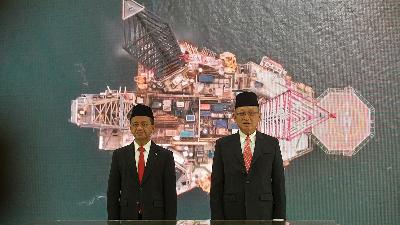
Just months before the end of his term, Jokowi appointed Bahlil Lahadalia as Energy and Mineral Resources Minister. The position is considered prone to conflicts of interest.

Thirteen-year-old Afif Maulana was found dead under a bridge in Padang, West Sumatra. He had allegedly been tortured by the police.
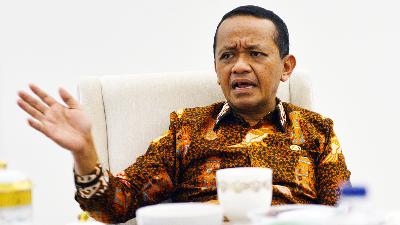
Interview with Minister of Investment Bahlil Lahadalia about mining business permits IUP for mass organizations, and the debate with Luhut Pandjaitan.
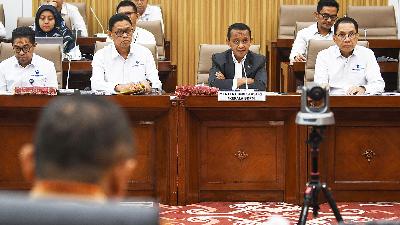
The role of Bahlil Lahadalia in revoking mining business licenses draws attention of the House of Representatives and civil society groups, amidst concerns of possible licensing corruption.

The number of Indonesian umrah minor pilgrimage travelers grows during the fasting month of Ramadan. The nation’s umrah economic potential has not been fully harnessed.

Bahlil Lahadalia explains the uproar over the revocation of mining permits as well as alleged extortion of money and shares in exchange for reinstatement of the permits.

Bahlil Lahadalia has a glimmering political and businees career. He is aiming for Golkar Party’s top position.

The claim that the Gunung Padang site is the oldest pyramid in the world is strongly challenged. A collaboration of researchers from around the world is needed.

Foreign archeologists doubt the site of Gunung Padang as the world’s oldest pyramid. A journal publisher is going to investigate.

Top management of Bank Mayapada allegedly obtained kickbacks from customer credit disbursements. The OJK was lax in their oversight of this bank owned by a member of the Presidential Advisory Council.

The concept of Kampung Madani is to optimize the business and economic potential of the region. #InfoTempo

Some villagers in Wadas have been fighting against the plan to mine andesite in the village for years. These protestors and the activists assisting them have been subject to various efforts to intimidate.
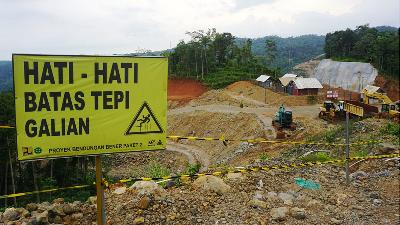
The government is insistent on excavating andesite rock in Wadas village. Opening the mine to build a dam altered the zoning regulations and ignores potential landslides.

Poaching produce in the North Natuna Sea is not only triggered by economic need. According to the Director of the Fleet Monitoring and Operations of the Marine and Fisheries Resources Directorate-General in the Maritime Affairs and Fisheries Ministry, Pung Nugroho Saksono, a conflict similar to the Sipadan-Ligitan case between Malaysia and Indonesia should not be allowed to recur.

Being an ambassador will be a new experience for both Todung Mulya Lubis and Muliaman Darmansyah Hadad.

Slamet Ambari, as Jadag in the film Turah, won Tempo’s Best Actor because of his impressive portrayal of a frustrated character.

Organic coffee farming in Kiadan Plaga is the main source of income. It is also a vehicle for the village’s brand of ecotourism.~

Rizieq Syihab, charged in a pornography offense, did not show up at his scheduled questioning at the Jakarta police headquarters on April 25. He said he wanted to travel to Mecca, Saudi Arabia, to perform the lesser pilgrimage (umrah). This Grand Imam of the Islam Defenders Front (FPI) promised he would be present for questioning upon returning from the Holy Land in mid-May. However, the post-Ramadan fasting month holiday has passed and he has yet to return to Indonesia.

LAST Wednesday an Achmad Sadali abstract painting created in 1973 was on display on the mezzanine floor of the Energy Building in Senayan, South Jakarta. Hundreds of people visiting the exhibition were seen immersed in the beauty and detail of the painting. It is not every day that the public gets to enjoy the painting from Arifin Panigoro's collection, by a painter known as the founder of the Bandung school.

When he was still the inspector-general at the Ministry of Finance three months ago, Kiagus Ahmad Badaruddin, 59, was angered by a report on a sum of Rp3 billion that had been deposited into his wife's account. It shook him, particularly since he was being considered for the position of chairman of the Center for Financial Transactions Reporting and Analysis (PPATK).
That report spread to the Presidential Palace and to the finance ministry. Finance Minister Sri Mulyani, who recommended Badaruddin to be PPATK chief, took a deeper look at the report. "She asked me what the money was all about," recounted Badaraddin, or Badar as he is familiarly known.

When he was still the inspector-general at the Ministry of Finance three months ago, Kiagus Ahmad Badaruddin, 59, was angered by a report on a sum of Rp3 billion that had been deposited into his wife's account. It shook him, particularly since he was being considered for the position of chairman of the Center for Financial Transactions Reporting and Analysis (PPATK).
That report spread to the Presidential Palace and to the finance ministry. Finance Minister Sri Mulyani, who recommended Badaruddin to be PPATK chief, took a deeper look at the report. "She asked me what the money was all about," recounted Badaraddin, or Badar as he is familiarly known.

The chairman of the Financial Services Authority (OJK), Muliaman Hadad, 56, is optimistic about the coming year. He believes Indonesia will greet the coming year with growth exceeding the 5.2 percent target set by the government. "We can do it if we harness domestic potential optimally and continue with our reforms and transformation programs to enable investment," said Muliaman.
His views do not reflect those of global economic leaders who met at the annual conference of the World Bank and International Monetary Fund (IMF) in Washington, DC recently, at which Muliaman himself attended. Participants at the meeting proclaimed that the world economy was growing exceedingly slow, taking far too long to recover and benefitted only a handful of people. They concluded that the weakening of the global economy which began in 2014, had yet to recover in the coming year.

Corruption is suspected in the procurement of the TNI's six new sets of radars. The BPK and the KPK must be given access to scrutinize the transaction.

AIDUL Fitriciada Azhari, 48, turned out to be the dark horse in the search for a chairman of the Judicial Commission. He was a last-minute entry after the House of Representatives' (DPR) law commission rejected two of the candidates, and he got the job. "I wasn't even under consideration so it was just pure chance," said Aidul at his Jakarta office last week.
He is now responsible for completing the work to be done by the commission, from reinforcing its legitimacy to ironing out relations with the Supreme Court and addressing the problem of judges' safety. "All this is to protect the integrity of the judiciary," he told Tempo reporters Tulus Wijanarko, Fransisco Rosarians and Raymundus Rikang.

After the noon prayers, Irzal Rakhmadani, 24, packed his things in a rucksack and went out. Two items he never goes without are his stethoscope and sphygmometer. He would ride on his motorbike to the office of the World Wild Fund for Nature (WWF) in Palangkaraya, Central Kalimantan, three kilometers away. There, he would treat people suffering from the effects of forest fire smoke around Palangkaraya. In 2015, he treated some 1,000 patients.
In mid-September, Irzal and his colleagues visited a camp for workers who had been laid off by an oil palm company. Fifteen volunteers of Earth Hour Palangkaraya had gathered to help the smoke victims there. Irzal saw something that distressed him. About 300 people were crammed into a 5x15 meter barrack. Because there was not enough room, tarpaulin tents had been set up outside the barracks. People lived alongside chicken and their pet dogs.

Magnus Ekbom stepped into a meeting room in a building on Jalan Rasuna Said in Kuningan, where the e-commerce company has just moved its offices a few months ago to accomodate his growing team.
At the helm of Lazada since 2012, Ekbom has ushered the online shopping platform to be the biggest in Indonesia. But he is not planning to take a breather just yet. For Ekbom, running an e-commerce company is like running in a marathon. "And we're only in the first couple of kilometers down the line," he said.

According to Prasada Rao, ignorance has been the biggest barrier in dealing with the decades-old HIV/AIDS epidemic. This is why he speaks openly about the disease, freely discussing such topics as sex and sex education, which most Asians see as taboo, so that the social stigma attached to its victims can be erased, a first step in the prevention and treatment of the disease.
Rao truly believes that an open discussion of the subject would be the best protection against the disease, yet the biggest challenge in addressing this global epidemic. "For Asians, sex is taboo. It's in your bedroom, not on the road. So there's always that challenge," he told Tempo.

TWO hours into a pleasant voyage on the waters of the Padaido group of islands to the south of Biak in Papua, the situation became tense. That Saturday morning two weeks ago, photographer Tony Hartawan and I had just passed Pakreki island. The waters around this large unoccupied, rocky island covered in lush tropical forest, seemed to be a final test for us before arriving at our destination: Meosmangguandi island.
The sea, which had earlier been quite calm, suddenly became very rough. Suddenly, our boat, a 'johnson' perahu, as local fishermen call their traditional boats with attached engines, was hit by waves coming from all directions. Tony, who was sitting in the stern, several times glanced to the rear, a fixed smile on his face. I responded with no less a worried expression. "Meosmangguandi!" The shout from Melkias Rumkorem, a traditional Meosmangguandi elder, brought with it a new sense of calm. He pointed towards where the boat was heading, all while it was rising, falling and rolling from side to side over the waves.

Engraved on a 15-meter-high stone pillar are 14 eternal edicts. Carved in the 2nd century BCE, the edicts were made by Piyadasi or Devanampiyadasi, the king who ruled the area that now forms most of India.
Almost all its lines are fascinating, but the most stirring is the seventh edict:

THE Energy and Mineral Resources Ministry has an ambitious plan for next year: raising the budget for the development of renewable energy by 10 times. "The future of Indonesia's development depends on seeking and building renewable energy. We can no longer rely solely on fossil fuel energy, which is bound to become scarce," said Dadan Kusdiana, director of the ministry's section on bio-energy.

A strain of wheat developed by researchers at the Andalas University School of Agriculture in Padang, West Sumatra-the Galur SO-3, or GURI 6 UNAND-has been identified as one of four superior varieties of wheat by the Cereal Plant Research Center last November.

Rice, rendang beef stew, jackfruit curry and many kinds of sambal (chili paste) sit in the front lanjar (guestroom) of Etek Nuraini's traditional rumah gadang house in Nagari Sumpur, in the Tanah Datar regency of West Sumatra. It is early in the month of February. Some 40 guests have gathered, including village elders and West Sumatra Governor Irwan Prayitno. Guests sit on the floor, eating side-by-side. Prayers are recited for the safety and wellbeing of those who will inhabit the house. Family photos hang on the wall. Windows are left open to let sunlight in.
From the vantage of the dining area, the house's spacious interior is in clear view. Six jua (Cassia siamea) pillars grace the building's 17-meter-long sides. Jua, a type of ulin ironwood, is extremely durable: once dry, its impossible to cut it down to size. The walls, meanwhile, are made of surian (Toona ciliata), and floors from bayur (pterospermum javanicum) tree trunks.

Forty young men strain and groan, taut muscles shining with sweat as they haul a jua tree (Cassia siamea) out from a ravine near Singkarak Lake, West Sumatra. The trunk is 11 meters long and will be used as the main pillar in a rumah gadang (traditional Minangkabau house). The house is being built for the heirs of Etek Siti Fatimah in the hamlet of Nagari, Sumpur village, Tanah Datar regency. Etek is what locals call an aunt, or a respected female figure.
The men take turns pulling the tree up and out of the gully. Shortly after noon, they reach the top. After clearing another small rise they toss the trunk down the other side, watching it tumble downhill.

Fighting corruption is nothing new in Indonesia. But the battle fought by people in rural areas may be something that is little known by the general public. According to Zainal Arifin Mochtar, Director of the Center for Anti-Corruption Studies at Gadjah Mada University, efforts by villagers to fight corruption have to be considered significant, because so far, awareness about fighting it is mostly present amongst the middle classes in urban centers.
Urban communities are generally better informed and they are abetted by the many anti-corruption activists in towns. But when anti-corruption figures in the country's remote areas begin to emerge, it is a most important development.

The banking business is in a flux as a result of the war of interest rates among banks. But the owner of the Mayapada Group, Dato Sri Tahir, is optimistic that the banking sector in Indonesia will continue to grow. "Growth depends on situations and conditions," Tahir told Tempo, two weeks ago. Having travelled all over the world, Tahir concluded that the best investment opportunities are still found in Indonesia.
He believes that investment opportunities in Indonesia are still better and that includes the business prospects of his Mayapada Group. He told Tempo reporter Christine Munthe in an interview that he would never sell Mayapada for whatever price. Excerpts:

A national research team has discovered ancient buildings and artifacts at the Mount Padang archaeological site in, Cianjur regency, West Java. The team's deputy chairman for geology, Danny Hilman Natawidjadja, said they had found a 22-centimeter-long stone rod on the mountain's southern slope, about two or three meters below the surface. The rod has pores and magnetic characteristics that attract it to metal. "It resembles Harry Potter's magic wand, which is fit for gripping," Danny said last week.
Other finds included knife-shaped metals, metal waste and burned soil with stacks of stones beneath. Based on laboratory tests, the burned residual materials have been in the location since 5,200 BC.

The face on one of the terracotta piggybanks at the Majapahit Museum in Trowulan, East Java, has chubby cheeks and slanted eyes. The right and left eyebrows are connected, curving dramatically like a wave. The lips seem to smile faintly, expanding the already thick chin.
This is the piggybank Muhammad Yamin saw decades ago and declared the face of Gajah Mada. In reality, poet Sapardi Djoko Damono contends, that face bears more resemblance to Yamin himself. Sapardi thinks the real face of Gajah Mada was not as chubby as the terracotta figure's. Agus Aris Munandar, a University of Indonesia archeologist who has studied Gajah Mada, also differs from Yamin in his interpretation of the face of the man who uttered the legendary Sumpah Palapa (Palapa Pledge), in which Gajah Mada vowed not to eat any spices until he had conquered the whole of the Nusantara archipelago for the Majapahit empire.

Indonesia is Canada's biggest export market in the Association of Southeast Asian Nations (ASEAN). To further strengthen the two countries' economic relations, Canadian Foreign Minister John Baird visited his Indonesian counterpart, Marty Natalegawa, on Tuesday last week.
During a press conference at the Pancasila Building in Jakarta, Baird expressed Canada's interest in cooperating with Indonesia in a number of sectors. "We want the same thing: work opportunities and improvement in people's welfare," he said. According to Marty, one of the sectors the Northern American country wants to focus on is transportation. "Canada's investment is highly positive," Marty said.

The KPK is looking into the connection between Toto Hutagalung and Bandung Mayor Dada Rosada in the bribery case of Judge Setyabudi. Allegedly, Toto often got projects from Dada.

Madakaripura, Gajah Mada's last abode, is not in Probolinggo, as has been long believed, but in Pasuruan.

A cross-disciplinary team of scientists is studying a controversial archeological site: Mount Padang. Is it true the site is 10 times larger than Borobudur?

The month of Ramadan (fasting) will end with the Idul Fitri holidays, a cause for joyous celebration. Young and old, the high and the low, will come together in a new beginning, marked by day-long feasting and fun. But there will also be a sobering moment of spiritual reconnection, of forgiveness and joint prayers, giving thanks to the greatness of God Almighty. At this joyous time, Tempo English Edition presents a special photo essay of Ramadan celebration in eastern Indonesia.

The population of bidadari (Standardwing) birds, the mascot of North Maluku, is gradually restored. A group of young bird lovers in Halmahera plays a major role.

A mining company filed a lawsuit against Radar Tegal. The media is deemed to have violated procedures in the Press Law.

The management of Soekarno-Hatta Airport is muddled due to aged power and radar systems.

In several villages in Ngada regency, Central Flores, water was once a rarity frequently fought for. Locals finally managed to “penetrate” water springs through three-village cooperation.

Lombok’s Sasak Muslims enjoy unique traditions during Ramadan.

Bloggers in Malaysia united to ridicule and criticize Prime Minister Abdullah Badawi, but Pak Lah, as he is familiarly known, withstood the onslaught.

Eight pairs of candidates for gubernatorial posts signed a declaration for peaceful regional heads elections (Pilkada) last Thursday. The ceremony took place before the Baiturrahman Grand Mosque, Banda Aceh.

THE life rhythm of this youth suddenly changed in mid-July. He is now spotlighted, photographed, interviewed and gets to meet all kinds of people. Jonathan Pradana Mailoa is receiving praises galore because he is the shining star in a nation that is going through so much darkness: earthquakes, floods, famine and that endless disease called corruption. Indonesias reputation went up a notch through the brilliance of this 16-year-old, when he became the absolute winner of the 37th International Physics Olympics, held in Singapore and participated in by 86 countries.

Even before the verdict handed down in The Hague last Tuesday, Malaysia had long been occupying Sipadan and Ligitan. TEMPO journalist Wenseslaus Manggut, who recently traveled to the islands, was unceremoniously told to leave in no uncertain terms by the Malaysian Police.

Semen Padang has rejected the governments wish to replace the companys board of directors. The reason for this was that financial performance was improving. Whats going on?

Expanding Padang restaurants apply a variety of business models to produce a remarkably consistent cuisine.

The planned sale of Semen Gresik-Padang-Tonasa has become extremely complicated since the West Sumatra DPRD and local government took over Semen Padang.

The KPK named five suspects in the Bank BJB advertising budget corruption, but it has yet to implicate high-ranking officials in the West Java Provincial Administration.

The 2025 State Budget’s Financial Note illustrates Prabowo Subianto’s financial policies. There is hope for economic improvements.

The 2025 State Budget accommodates several of Prabowo Subianto’s programs. Lobbying efforts are underway to ensure the smooth implementation of these priority programs.

Jokowi is involving Prabowo Subianto’s team in the drawing up of the 2025 Draft State Budget. He ignores the principle of caution in budget management.

The biggest budget absorbers in 2025 will be the development of the new capital city and the free nutritious meal program. A great number of civil servants will soon relocate.

The government’s plan to remove the deficit cap on the State Budget could reduce investor confidence in the financial markets, sending the debt burden soaring.

An overly ambitious growth target could trap Indonesia’s economy, leading the government to adopt misguided and hazardous policies.
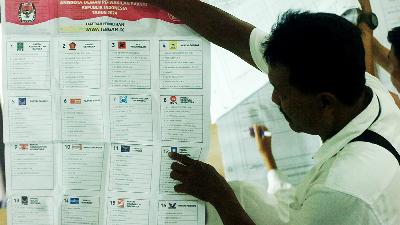
A number of political parties may not make it to Senayan if they fail to meet the parliamentary threshold. These parties are on a limited campaign budget and do not have enough witnesses.

The government’s decision to block the state budget’s allocation for social assistance is dangerous. Campaign interests may be the reason.
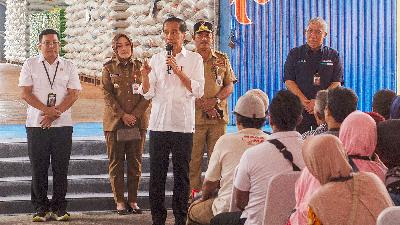
The 2024 State Budget’s automatic adjustment funds are redistributed to social assistance programs and fertilizer subsidy. This policy may be in violation of two laws.

The recycling process of used Coca-Cola plastic bottles at Amandina Bumi Nusantara gets community support.
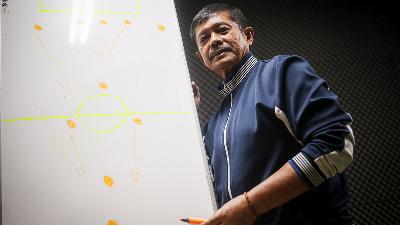
Head Coach of SEA Games National Soccer Team, Indra Sjafri, on his game strategy and the target for the 2034 World Cup.

Letters on getting Tempo magazine and the rejection of cooperatives to OJK’s oversight.

The government issues a number of policies ahead of the United Nations Climate Change Conference (COP27). The ambitious targets are deemed impossible to achieve.
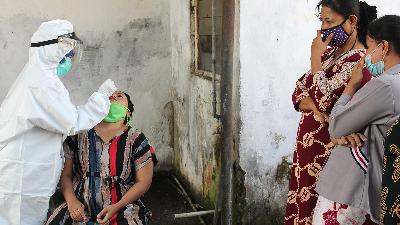
Efforts to mitigate the pandemic in some regions are disorganized. The central government is considering the option to divert the regions’ Covid-19 mitigation budget.
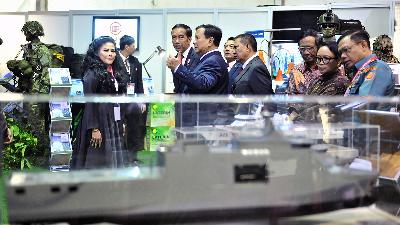
Budget for primary weapons systems is suspected only known to the defense ministry. The government is preparing a legal structure so that the budget is not disturbed until all debts will have been paid off.
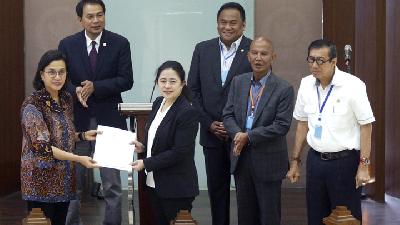
The act of using presidential regulations to make drastic changes to the state budget is seen as a violation to the constitution.

Jakarta’s draft budget contains numerous irregularities. Tempo’s investigation shows that the regional government’s monitoring has been weak in various stages of the budgeting process. Governor Anies Baswedan blames the system he inherited from Basuki Tjahaja Purnama.

Jakarta Governor Anies Baswedan should thank the people who uncovered the irregularities in the proposed provincial budget.
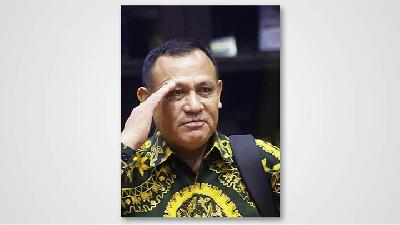
There is no other recourse: all elements of civil society need to move together to stand for the Corruption Eradication Commission (KPK).
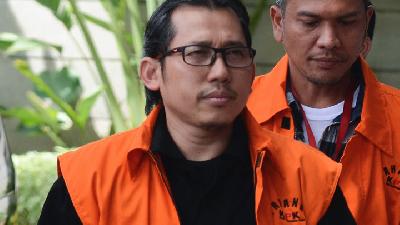
Yaya Purnomo, a former head of Regional Housing and Residential Finance Development Section at the Ministry of Finance’s Directorate General for Financial Proportionality, admitted to selling insider budgeting information to regional governments.

Villagers in Kubu Raya, West Kalimantan, are working together to build toilets for disadvantaged families. Village governments are assisting by helping fund the work.

Ayu Laksmi delivers unforgettable acting in Pengabdi Setan (Servant of the devil), despite a severely restricted performance.

There seems to be a climate of returning favors around the process of drafting the Jakarta Annual Budget. There must be no compromises for political deals.

The House of Representatives (DPR) have requested to have their budget increased by 70 percent for next year, do you agree?

The Supreme Courts new regulation targets corporations involved in criminal cases. It is aimed at getting the real owners behind proxy companies.

At the end of 2015, the Indonesian Motorized Vehicle Industry Association (Gaikindo) was optimistic automobile sales could grow seven percent this year, reaching 1.070 million units. However, as of mid-year, the expected growth has not been met. Last August, Gaikindo revised the target to 1.050 million units. "Even this will need hard work in the last three months of this year," said Gaikindo Kukuh Secretary-General Kumara told Tempo some time ago.

The government has issued a new regulation for the implementation of the tax amnesty program. It should focus on major tax evaders as its prime target.

Bappenas wants the power to determine budget allocations, an authority that currently lies with the finance ministry. President Joko Widodo is encouraging the use of a 'money-follows-program' budgeting model.

The government is concerned that revenues generated by the tax amnesty will fall short of its target. Efforts are being made to raise the deficit threshold.

With the end of Ramadan fast approaching, Bambang Brodjonegoro's busy schedule has just begun. His days are filled with one ministerial meeting after another. He must also keep monitoring two legislative bills currently being discussed by the House of Representatives (DPR) to ensure that they are passed by the end of the month as scheduled. One bill concerns the revised state budget (RAPBN-P) and the other is on the tax amnesty.
The revised state budget will be slashed by Rp90 trillion to account for declining revenues. Another way of addressing the shortfall is through tax amnesty, which is expected to bring additional revenues of up to Rp165 trillion. Bambang sincerely hopes the DPR will enact the two legislations. "The government's program, including the revised state budget, should be backed by the parties claiming to support the government," said Bambang.

THE government seemed oblivious to a looming budget crisis as it continues to apply unrealistic assumptions in the draft revision of the 2016 state budget. Spurred by the highly ambitious growth target of 5.3 percent, the tax revenue target was set at Rp1.527 quadrillion-clearly a tall order given the sluggish domestic economy.
After the International Monetary Fund (IMF) corrected its projection of Indonesia's growth to 4.9 percent, the government finally lowered its target to 5.2 percent, but strangely enough, the tax revenue projection remained the same.

AT a gathering in Pammulukang village, Mamuju Regency, West Sulawesi Province, 20 women sit discussing a deadly serious topic-the construction of a long-awaited road that will connect several villages. They discuss the matter of ensuring easy access for all, the type of materials to be used, and the profile of the contractor.
The meeting, which would usually last about two hours, can take longer if certain suspicious details emerge, such as if in a budget allocation for Rp100 million, the cost is set at just Rp80 million. Or, if for construction of a 100-meter road, the distance is listed at only 80 meters. "We will not accept things calmly if something fishy about the project execution emerges," Rusnani said a month ago.

Last week, the government announced this year's first-quarter growth rate reached 4.92 percent, slightly higher than the 4.73 percent growth for the same period last year. Earlier, April inflation, year-on-year, was reported to drop to 3.60 percent, still comfortably within Bank Indonesia's inflation target range. Also, the rupiah remained stable at Rp13,300 per US dollar, just slightly weaker than previous week's Rp13.100 per US dollar level.
In addition, a team from Standard & Poor's (S&P) recently met with the government, which points to a possible rise in Indonesia's sovereign ratings, which for quite some time have languished at the BB+ level, one notch below investment grade. So far, S&P is the only major global rating agency that has not issued Indonesia an investment grade, as Moody's and Fitch have done.

THE January 14 bomb attack on Jalan Thamrin in Central Jakarta confirmed National Police Chief Gen. Badrodin Haiti's belief that the police are now the terrorists' prime target. One police officer was wounded in the explosion and four others suffered serious injuries from gunshot wounds.
One of the officers, First Adj. Insp. Budiono, sustained three close-range gunshot wounds. He narrowly escaped death after laying unconscious for three days at the hospital. "That was incredible. His heart had even stopped," Badrodin said.

ONE hundred and six members of the Jakarta Provincial Legislative Council (DPRD) seemed pleased when their four demands were granted. In the 2016 Jakarta Regional Administrative Budget (APBD), four components in the council's expense budget were significantly increased. These include budgets for travel and recesses, new meeting tables and chairs and new laptops.
The budget for travel expenses, for instance, was raised from Rp430 thousand to Rp1.5 million. Jakarta DPRD Deputy Chairman Muhammad Taufik, a Great Indonesia Movement (Gerindra) Party politician, said it had been twelve years since the travel budget was last increased. "We often had to cover the excess," he said.

Minister of Foreign Affairs Retno Marsudi expressed Indonesia's desire to strengthen economic relations with Vietnam during an official visit by Vietnamese Deputy Prime Minister and Foreign Minister Pham Binh Minh on June 25.
"We recently celebrated the 60th anniversary of diplomatic relations and both countries have maintained a strategic partnership since 2013," Rento said. Also in 2013, a goal of expanding trade to US$5 billion between the two nations was set. Retno said the target would be reached ahead of schedule. "Therefore, we move on to the second part of our bilateral trade agreement to reach US$10 billion in trade by 2018," she said, adding that she hoped the target would also be achieved at an earlier date.

In 2011, the proposed aspiration funds was rejected. Today, it is being attempted again and at an incredibly high amount-Rp11.2 trillion a year. By this program, each legislator in the House of Representatives (DPR) would get an additional allocation of Rp20 billion a year.

THE public is tired of watching the feud between Jakarta Governor Basuki Tjahaja Purnama and members of the Jakarta Provincial Legislative Council (DPRD). The 2015 Regional Budget (APBD) has still not been decreed as a regional regulation because of the crisis between the two parties. As a result, Rp73.08 trillion of funds cannot be disbursed. A number of development projects are stuck and employee benefits have not been paid for the two months.
Of the 1,328 respondents that joined last week's Tempo poll, 63.1 percent agreed the government could use the 2014 Regional Budget instead. However, doing so would create complications, because not all the programs outlined in the 2015 budget were budgeted last year. For example, in the 2015 budget plan, funds allocated for Jakarta civil-servant allowances amount to Rp10.8 trillion, or 16.09 percent of the total budget. In the 2014 budget, such funds are drastically reduced.

AT the end of February, Jakarta Governor Basuki Tjahaja Purnama dropped off a bundle of documents at the Corruption Eradication Commission (KPK) headquarters. Inside was information on a number of procurement projects in the 2014 and 2015 Regional Budget (APBD) that Basuki suspected of being marred by 'phantom programs'. "The phantom budget hiding in the 2015 APBD comes out to around Rp12 trillion," he said.

Jakarta Governor Basuki Tjahaja Purnama, better known as Ahok, said that fictitious programs in the regional budget were smuggled in by Jakarta legislators after the completion of a hearing approving the 2015 budget. Included in the proposed additional budget were also accompanying threats of difficult disbursement of funds if the additional budget was not approved.

THE SYSTEM of electronic budgeting, or e-budgeting, applied this year by Jakarta Governor Basuki 'Ahok' Tjahaja Purnama has unveiled several budget manipulations. The electronic system freezes the budget after its endorsement by the Regional Legislative Council (DPRD), prohibiting any alterations. This year, Rp12.2 trillion in budget irregularities have been identified.

THE conflict between Jakarta Governor Basuki Tjahaja Purnama and the Jakarta Regional House of Representatives (DPRD), also known as the Jakarta City Council, over the city's 2015 budget is yet another example of the pervasive dark forces that continue to manipulate public funds for interests other than the common good. His determination to cross out the mysterious Rp12 trillion allocation from the budget incurred the predictable opposition from council members. Ominously, this has led to a possible right-to-inquiry motion against the governor, or Ahok as he is better known, in the Jakarta DPRD.
Ahok's decision over the annual budget is in line with the objectives and functions of the Jakarta administration. According to the Constitution, budgets are created to become guidelines for revenues and expenses in the process of managing regional activities. With the current budget, production and employment opportunities are expected to increase, so it can propel economic growth and prosperity for the people. From the distribution side, regional budgets must take into consideration the sense of justice and well-being.

THE Jakarta Regional House of Representatives (DPRD) plans to use its right of inquiry to take action against Jakarta Governor Basuki Tjahaja Purnama for not submitting the 2015 Regional Budget which they had approved. Basuki reasoned that the DPRD added the proposed Rp12.2 trillion to the budget outside of the plenary meeting and commission deliberations with the government.

Anton Hendranata*
The aura of optimism emanating from the revised budget 2015 is quite apparent. On the 2015 economic growth, the government assumption is set at 5.7 percent, higher than the analysts' consensus of 5.35 percent. It is understandable that government would be more optimistic, considering they have set a longer-term growth target of 7 percent.

Anton H. Gunawan*
It is definitely not a 'business-as-usual' government budget. The proposed revised budget of 2015 (RAPBNP 2015) is full of promise. It also shows new approaches, both on the spending and the financing sides, and to a lesser degree on the revenue side as well. The headline numbers may have indicated a less expansionary revised budget, i.e. fiscal deficit is lower at 1.9% vs 2.2% of GDP, than in the original budget (APBN). However, its spending composition reflects a more expansionary budget, which is much needed in this subdued growth environment. Indeed, if the budget plan is correctly implemented, the government could take some credit for helping reduce individual income inequality and interregional disparity.

After being cleared of allegations that he had ordered his subordinates to bribe lawmakers to approve his ministry's budget, Energy and Mineral Resources Minister Jero Wacik now finds himself in the middle of a new corruption scandal. Last Wednesday, the Corruption Eradication Commission (KPK) finally charged Jero, who has authored introductions to high school science textbooks, with extortion.
KPK Deputy Chief Bambang Widjojanto said Jero's methods were something new. The minister was suspected of tampering with the ministry's budget by raising money from sponsors for unimportant events. "This practice constitutes abuse of power leading to extortion," Bambang said last week.

THE Constitutional Court ruling limiting the authority of the House of Representatives (DPR) Budget Committee deserves praise. Previously, the authority of the Budget Committee, which extended to the third level of budgetary items, led to many problems with the management of the state's finances. Several ministries and state institutions had complained about frequent blocking of their budgets or delays to the release of funds-marked with an asterisk, and known as 'starred'-for reasons that seem contrived.
The Court ruling was triggered by a lawsuit filed by several NGOs, including Indonesia Corruption Watch, the Legal Aid Foundation, the Indonesia Budget Center, and the Indonesian Forum for Budget Transparency. They launched a legal challenge against several articles in Law 27/2009 on the People's Consultative Assembly (MPR), the DPR, the Regional Representatives Council (DPD) and Regional Houses of Representatives (DPRD). They also challenged Law No. 17/2003 on the State Budget, taking the view that it contravened the 1945 Constitution on the state funding as laid down in the State Budget. They even called for the Budget Committee to be dissolved.

A state capital participation budget of Rp5.75 trillion was passed without DPR approval. Some of the money is purely administrative, some of it hard cash.

Successful businessman and Golkar politician Setya Novanto is known to be good at arranging the outcome of budget deliberations. Somehow, he has managed to avoid being charged or found guilty in a number of cases.

The Finance Ministry has halted the disbursement of the defense budget,s Rp678 billion, resulting in protests and conspiracies.

PAN politician Wa Ode Nurhayati is named a suspected budget broker. It is an effort to uncover mafia at Senayan.

The process of approving a Rp500 billion budget at the Transmigration Ministry is being questioned. Charges of deal-brokering are raised again.

The DPR resembles a clearing house for illicit transactions when public policy is being made. The formulation of budgets or deliberations on the articles of draft laws are often tainted by money politics. Regional chiefs scramble to pay bribes in order to get their budget allocations.

Pepi Fernando learned how to assemble bombs from the internet, according to the police. The bombs made by the graduate of the Syarif Hidayatullah State Islamic (UIN) University in Jakarta, are indeed low-power. However, if detonated, the bombs in a number of locations would be no less powerful than those of the Jemaah Islamiyah (JI) group. The targets varied: from the president’s entourage to places they suspected of being nuclear installations.

The Malang soccer conference failed to change the PSSI. Rather than continue to hope, just forget the organization.

The local regulations on transparency and participation were passed in 2004. The committee takes on various issues, from budget discussions to chicken coops.

The 2010 State Budget is too conservative. With hard work, growth can exceed 5 percent.

The 2009 Budget is full of political baggage. Many of the targets are unrealistic.

Indonesia’s oil production target is increased. In two months, production has yet to reach 900,000 barrels per day.

Differences in religion disappear in disaster areas. In shelters, webs of togetherness are woven.

Parliamentary debate on the Aceh Bill hits a snag over budget allocation for the province.

The funding level for the education sector in the 2006 State Budget has been declared unconstitutional. The Constitutional Court is giving the government a chance to fix this by amending this years spending.

Budget brokers in the DPR are gradually being identified. They had the gall to conclude agreements with their victims.

The government has increased the target for tax revenues although it would be best to lower the tax rates and raise the taxpayers' compliance level.

The government wants the budget to provide a growth stimulus—But its sources of funding are limited.

Finance Minister Boediono is working against time to patch up the budget deficit.

IBRA sold Indomobil to Trimegah for a low price of Rp625 billion, perhaps because it was chasing to meet its required deposit target. But, according to Mar'ie Muhammad this was not necessary and Indomobil should not have been sold.

Many praise the Draft State Budget 2002. They think it can strike a balance between efforts to reduce deficits and to encourage economic recovery. But, caught between the two efforts are the ordinary people who are becoming increasingly miserable.

Although overwhelmed by endless problems, the Indonesian contingent to the SEA Games is targeting 101 gold medals. Is this realistic?

The government has revised the 2001 State Budget—and resorted to some unpopular steps. But without strong leadership and support of parliament, the review is a paper tiger.

Indonesia's 2001 state budget and the deficit have swollen up into a difficult challenge. Is the government capable of dealing with the problem?

With little left to finance the deficit, there is no other way but for the government to revise the 2001 state budget and cut spending.

In the 2001 State Budget Plan, regional income will sharply increase. However, debate still lingers over its distribution.

The government writes off non-performing loans of fishermen and small business owners. Detailed criteria can prevent moral hazards.
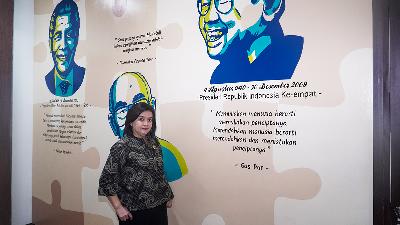
National Commission on Human Rights (Komnas HAM) Chair Atnike Nova Sigiro on human rights enforcement in the Prabowo Subianto era.

There are many irregularities in relation to the detention of Tom Lembong. Without sufficient evidence of corruption, this case can be considered as politicization, and not enforcement, of the law.

Ridwan Kamil’s electability remains stagnant in the Jakarta regional head election. His supporting parties are not actively campaigning for him, leaving him hoping for support from Prabowo and Jokowi.
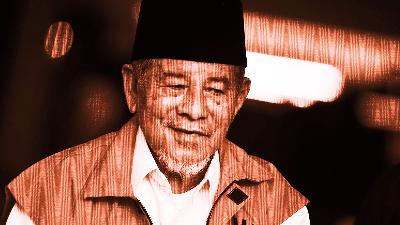
The term “Medan Block” emerged during the trial of former North Maluku Governor, Abdul Gani Kasuba. Medan Block is believed to refer to pre-allocated nickel mining concessions in Halmahera.

The new government under Prabowo Subianto is already formed. Can we hope for what the future holds?

The increasingly overcrowded refugee camps demand improvements in the mechanisms for handling Rohingya refugees. The number of refugees continues to rise.

A reader’s letter suggests authorities seek ways for safe and efficient logistics transportation, in order to minimize traffic accidents.
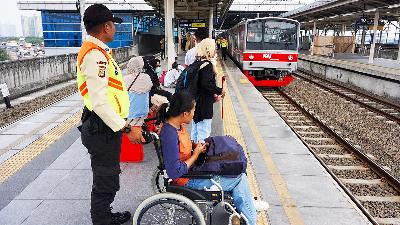
Despite some improvements, much still needs to be done regarding access to public transport for people with disabilities.
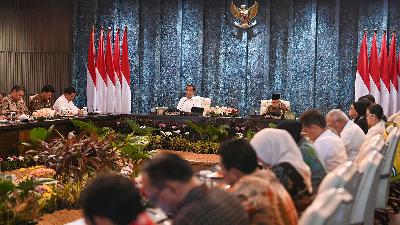
Jokowi is preparing for the incoming Prabowo-Gibran administration starting in late February 2024. He hopes that Prabowo can continue his programs.

News that there would be a mass rally to show support for Jokowi did not materialize. Had it been, then what for?

Foreign companies are urging President Joko Widodo to implement the power wheeling scheme. The private sector is pushing to hasten the energy transition.

There is increasingly compelling evidence of a gratification in the form of a private jet for Kaesang Pangarep. The KPK could investigate this thoroughly.

Commission XI of the House of Representatives will elect five BPK members. Several political parties are forming a coalition to support their strongest candidates.
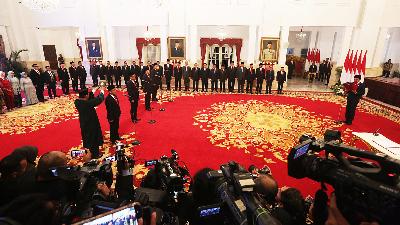
Two months before stepping down, Jokowi reshuffled the cabinet, selecting close allies of Prabowo Subianto.

The government provides facilities to make it easy for religious organizations to manage mines. Offers discounts on information data compensation rate.
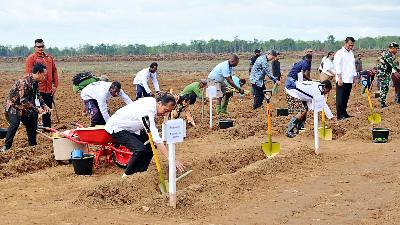
In a decade of Jokowi’s administration, deforestation reached 4.37 million hectares. This is partly attributed to national strategic projects in the food and energy sectors.

Senior member of Jamaah Islamiyah explains the reasons for dissolving the organization.

The BPOM does not approve the use of sodium dehydroacetate as a food ingredient. Emma Setyawati, acting Deputy for the Supervision of Processed Foods at BPOM explains.

Prabowo Subianto’s team is investigating the possibility of revising the State Finance Law and removing the debt ratio and budget deficit cap for the free nutritious meal program.
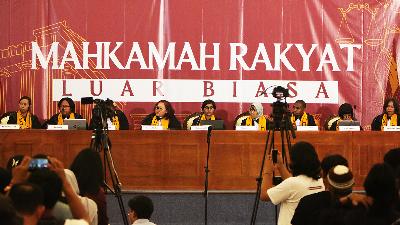
Summary of events of the week, from the People’s Tribunal trying Jokowi to the nine years sentence for former Pertamina CEO Karen Agustiawan.
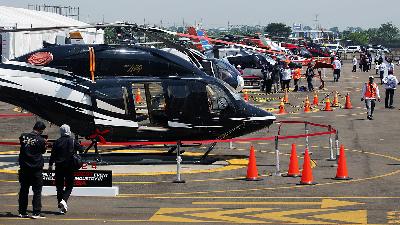
Aviation industry players are strategizing under pressure. Hoping for an upswing to focus on services.

The ecosystem restoration permit of Rimba Raya Conservation that was revoked by the Environment and Forestry Ministry was going to be taken over by other firm. The company filed a lawsuit with the State Administrative Court.

BP Tapera Commissioner, Heru Pudyo Nugroho, explains the compulsory 3 percent cut of monthly income for the public housing savings scheme.

Over three million netizens are rallying support for the “All Eyes on Papua” campaign. The government cannot turn a blind eye.

The National Police denied any role of the former Red and White Task Force with the shadowing of the Assistant Attorney General for Special Crimes Febrie Adriansyah. Police 2nd Brig. Iqbal Mustofa is not punished.

The rotation scene for Assistant Attorney General position is heating up ahead of the presidential inauguration. Candidates for Attorney General cannot come from political party officials.

The smuggling of endemic animals from Papua and Maluku runs rampant. Makassar becomes a black market for the illegal trade of protected wildlife.
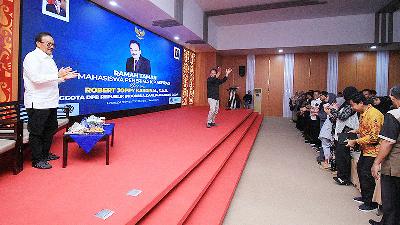
Education Commission members at the House of Representatives get quotas for distributing the Indonesia Smart Card. There are suspicions that it misses its target.
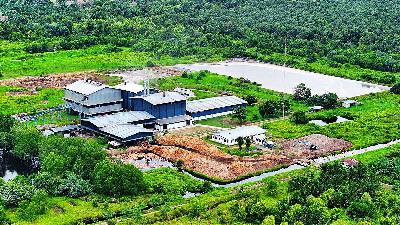
The enforcement of permanent legal rulings in numerous civil court cases, totaling Rp20.29 trillion, is facing delays. Recovery efforts have been stalled.

At least Rp20.7 trillion in fines for land and forest fires are not collected. The government is prepared to forcibly seize assets.
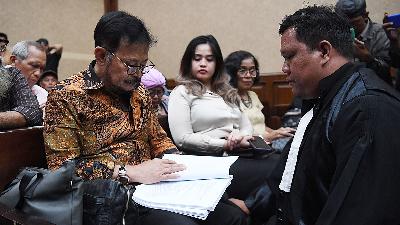
Agriculture Ministry high-ranking officials routinely took up collections to raise money for Syahrul Yasin Limpo from 2020 to 2023. They often used the treasurer’s cash account.

President Jokowi mobilizes his family and people close to him in the elections for regional heads. For the continuation of his political dynasty.

The government is asking businesses to provide dairy cows for the free milk and lunch program.

Political parties are preparing names for potential ministers in Prabowo’s cabinet. They are eyeing strategic positions.
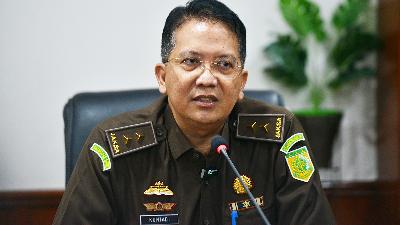
The Attorney General’s Office continues to look for other suspects in the tin sector corruption case. Robert Bonosusatya is also being questioned as a witness.

The situation in Gaza is getting worse for newborn babies and mothers giving birth.

Part of the public reveres habib and sayyid as a form of adoration for Prophet Muhammad. A controversy arises regarding the lineage of Bani Alawi.

The police named five suspects for human trafficking through the ferienjob program in Germany. This is exploitation of student apprentices.
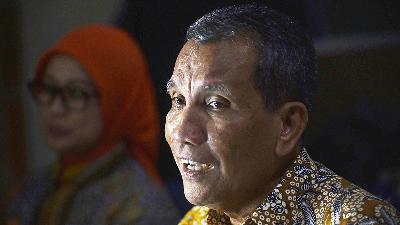
Corruption Eradication Commission’s Deputy for Prevention, Pahala Nainggolan, on the mechanism of administrative sanctions for companies mining illegally in forest areas.
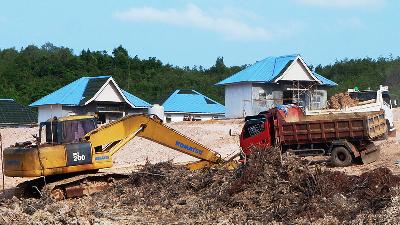
All residents of Sembulang Hulu on Rempang Island are united in rejecting relocation for the Rempang Eco-City project. The relocation land is still being disputed.

The government consolidates state-owned enterprises into around 30 companies to increase efficiency and provide space for the private sector.

There are indications that Jokowi is supporting Bahlil Lahadalia to become the next General Chairman of the Golkar Party. Airlangga Hartarto is fighting against efforts to hold an extraordinary party congress.

Jokowi and his ministers begin tinkering with the budget for the free lunch program. It is not appropriate and highly risky.
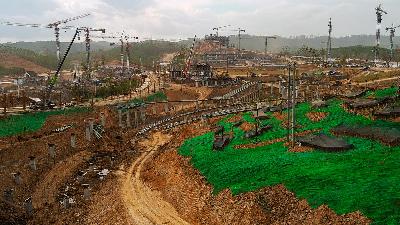
Deforestation covers an area of 2,464 hectares in Nusantara Capital City. Functional conversion of land threatens watershed areas, giving rise to a source of floods.
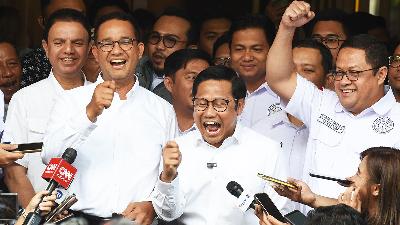
The coalition that supports the Anies-Muhaimin presidential bid is preparing to propose a House inquiry into election fraud. This effort is still waiting to see where Megawati Sukarnoputri stands on this issue.
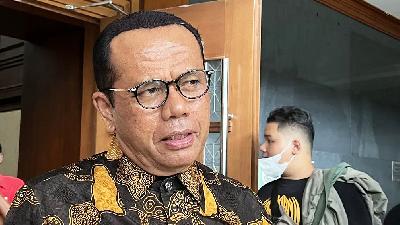
An interview with Juniver Girsang, the lawyer of Fajar Bhakti Lintas Nusantara directors, on the role of the Coordinating Minister for Maritime Affairs and Investment Luhut Pandjaitan in the internal dispute of a nickel company.

An interview with Director-General of Watershed Management and Forest Rehabilitation about the regulation on the protection and management of mangrove.

Jokowi has yet to propose a replacement for Firli Bahuri as KPK Chair. This is proof that the government does not care about wiping out corruption.
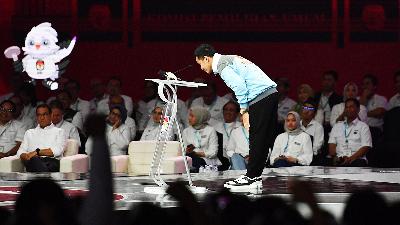
The police and a number of government ministries are working for a Prabowo-Gibran election victory. Some are using state funds for this purpose.

A new regulation expands the opportunities for batik imports by easing the import mechanisms, citing the needs of state institutions.

Jokowi reportedly puts Finance Minister Sri Mulyani under pressure over the issue of social assistance, which is vulnerable to being used for the Prabowo-Gibran presidential campaign.

New players are entering the carbon market of the forestry sector. They are competing for land from Sumatra to Papua.

The Jakarta government is carrying out an operation to control the cables cluttering the street. The responsibility for this issue lies in the hands of the local governments.

The gemoy dance is quite popular among young people. The campaign team for Prabowo-Gibran brings together many influencers to gather support.

The latest regulations on electric cars promise many conveniences for investors. Beneficial for new players.
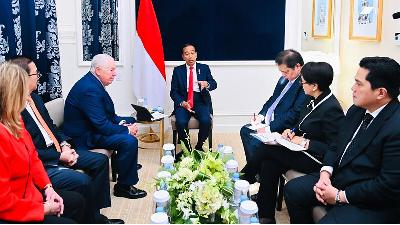
The government is revising the requirement for Freeport’s contract extension. The mining company is mandated to build a smelter in Papua and divest its shares.

The Palestinian homeland neither originates from the distant past, nor is it a hope for the future.

Interview with Chief of the RI Police Public Information Bureau Brigadier General Ahmad Ramadhan regarding neutrality of the police force.
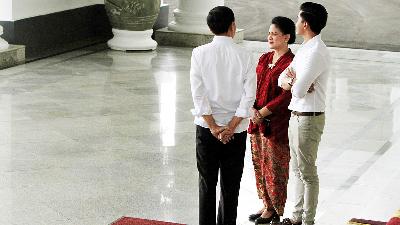
Iriana, the wife of Jokowi, has been advocating for Gibran Rakabuming Raka to become Prabowo’s vice-presidential running mate since the beginning of the year. She is actively garnering support among entrepreneurs.
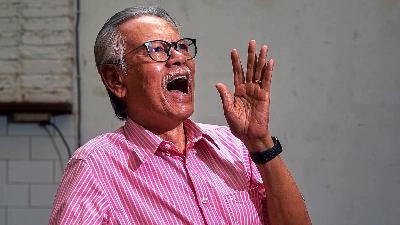
Erry Riyana Hardjapamekas had a meeting with the President before the Constitutional Court issued a ruling that allowed Gibran Rakabuming Raka to move forward as a vice presidential candidate.
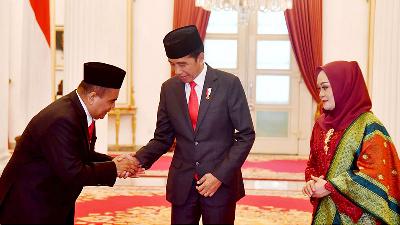
News of public officials’ campaigns for Prabowo-Gibran and the court verdict in the child kidney failure case.

President Jokowi actively supported the Prabowo-Gibran presidential nomination ahead of the Constitutional Court’s decision. A state institution was utilized to support the effort.

Firli Bahuri is a step away from being named an extortion suspect. The police have already got information from key witnesses.

The Attorney General’s Office responds to the report on the restorative justice for sexual abuse victims.
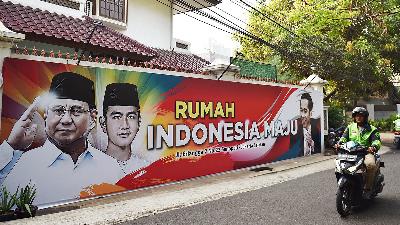
A number of volunteers are pushing for a Prabowo-Gibran presidential bid. They are hoping that a lawsuit at the Constitutional Court regarding age requirements for candidates will be decided in their favor.

NU sympathizers are always targeted by presidential candidates looking for votes. It could be nothing more than a mirage.

How is Arsjad Rasjid polishing Ganjar Pranowo for the upcoming presidential election?
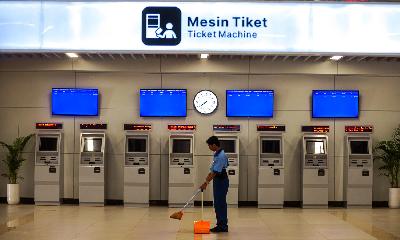
KCIC is considering its tariff for the Whoosh high-speed train. There is the option to change Argo Parahyangan’s route to eliminate competition for Whoosh.
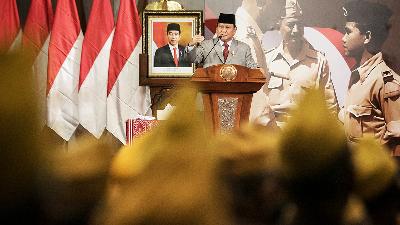
Prabowo Subianto is receiving support from retired military officers who used to be his opponents. They seem to have forgotten serious human rights violations in the past.

The government needs to respond favorably to the request from exiles for an apology, setting straight the historical record and a continuation of the judicial process.
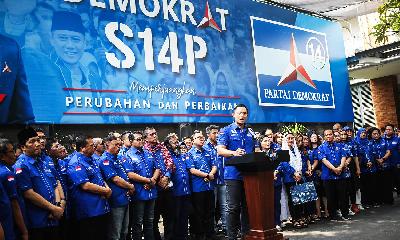
The Democrat Party is considering throwing their support behind Prabowo Subianto or Ganjar Pranowo. It could create a chance for reconciliation with Megawati.

People of Air Bangis village were beaten while demonstrating in Padang. Another intervention of the law enforcement authorities in agrarian conflicts.

Former government employees at the Foreign Affairs Ministry are demanding the disbursement of unpaid wages. How did it come to happen?
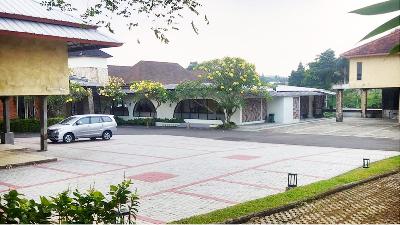
Frans Kaisiepo built dormitories for Papuan youth. He bore the burden of the Papua referendum or Pepera to his dying day.

A former campaign volunteer for President Jokowi is named a suspect in relation to an illegal nickel mining worth Rp5.7 trillion. A crooked syndicate that must be investigated.

Mind Id and Vale Canada are competing for control over Vale Indonesia. Negotiations may end in a stalemate.

A letter by a high school student on how he sees national education reform.

The coalition for Anies Baswedan is polarized in determining his vice-presidential candidate. NasDem rejects Agus Harimurti Yudhoyono, saying he has little chance of winning.

In Indonesia, the signal of tight liquidity in the global financial market is apparent in the significant fall in foreign reserves.
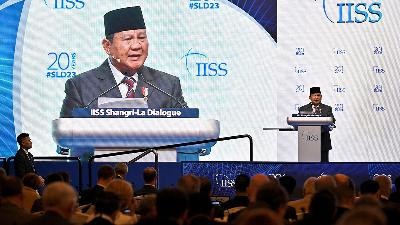
A summary of our news, from Prabowo Subianto’s proposal for the Russia-Ukraine war to Luhut Pandjaitan’s special privileges.

Three members of the House of Representatives are reported for committing sexual assaults. The legal process does not take the side of the victim.

There have been numerous problems surrounding the construction of BTS towers by the ministry of communication and informatics in remote areas. One of them is not paying the public for their land.
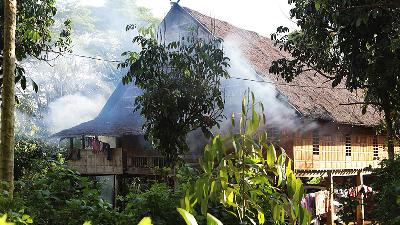
The Kajang indigenous community is considered the best forest guardian. They face threats from the regulations, plantation companies and modernization.

After a quarter of a century, the movement for change that was supported by students and ordinary people has faded away without any significant improvements. Activists are now trapped under the feet of those in power.
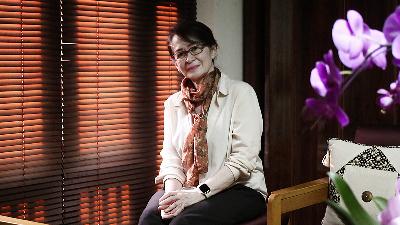
Women activists protested against Suharto’s authoritarianism before the 1998 Reformasi. Their activism was smartly camouflaged under the scarcity of baby formula.

The court should not have jailed AGH for three and a half years. There is not enough evidence.

None of the three presidential candidates are offering change. Vice-presidential candidates will be chosen based on their ability to provide logistics for the campaign.
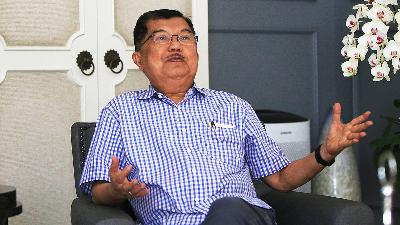
Jusuf Kalla challenges three governors to take over nickel mining areas controlled by foreign companies.

Companies from China, Europe, and the United States dive into nickel smelter projects. They are vying for positions in the electric vehicle ecosystem.

A closed proportional system encourages money politics and leads to the rise of brokers for legislative seats. An open system is more transparent.

Hashim Djojohadikusumo is leading the Indonesian delegation at the climate change conference COP29 in Azerbaijan. But he is more a representative of corporate interests.

The new government is trying to erase traces of past human rights violations. This hurts the victims and their families.

Prabowo’s close associates worked to prevent the issue of serious human rights violations from resurfacing. They prepared a white paper containing a narrative aimed at clearing Prabowo’s name.

The number of people suspected of protecting online gambling sites increases to 18. Employees of the Communication and Digital Affairs Ministry are involved.

The Communication and Digital Affairs Ministry is tidying up house now that 10 of its employees are accused of participating in online gambling. Their flow of cash is being scrutinized.

One of the suspects of the online gambling case is a regular in the ministers’ social circles, and active in the arts scene.

Former Communication and Informatics Minister Budi Arie Setiadi is implicated in an online gambling case. He allegedly met with representatives of gambling operators.

Efforts to block online gambling sites are proven futile, as many loopholes remain. Online gambling remains rampant in Jakarta.

We launch Tempo single brand, with news products integrated under one platform. Scores of new services will be offered.

The government’s policy of allowing MSME loans write-offs under certain conditions is deemed prone to moral hazard and misuse.

The most significant factors behind Trump’s victory were Covid-19 and the Federal Reserve’s response. Life is likely to become harder for Americans—and for much of the rest of the world.

Cartoon: Yuyun Nurrachman

The world still needs good people. But what is considered good has no clear law.

The future of BRIN is uncertain in the administration of Prabowo Subianto. It is caught up in a political deal with the PDI-P.

There are indications that the police are taking sides in local elections in a number of regions. This is the next setback for democracy after the presidential election.

Established to provide an opportunity to obtain loans, Danantara could sink Indonesia into a debt quagmire. Risk mitigation is key.

Minister of Higher Education, Science and Technology Satryo Soemantri Brodjonegoro explains BRIN’s position in the Prabowo government.
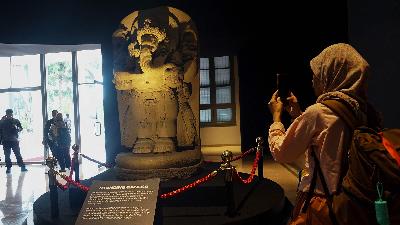
A collection of hundreds of cultural artifacts from the second phase of repatriation from the Netherlands is on display at the National Museum of Indonesia.

The position of BRIN remains uncertain under Prabowo Subianto’s administration. The restructuring of the research agency is hampered by political interests.

Jokowi and the police are helping to bring Ahmad Luthfi-Taj Yasin to victory in the Central Java Regional Head Election, allegedly pressuring village heads to show support.

Tom Lembong’s lawyer on the irregularities of his case.

Cartoon: Yuyun Nurrachman
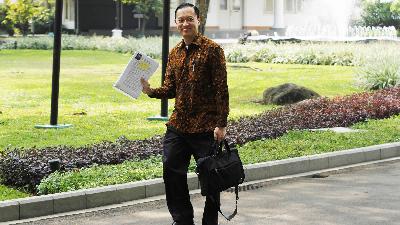
Tom Lembong owns assets worth Rp101 billion but does not own a house. He does not live with his wife and children in Jakarta.

The Supreme Audit Agency uncovered violations in sugar import practices during various periods of the Trade Ministry. Only Tom Lembong, the Trade Minister for 2015-2016, is indicted.

The Attorney General’s Office is still withholding the evidence in the sugar import case involving Tom Lembong. State losses remain unclear.

BI faces a dilemma over cutting rates amid the global volatility stirred by Trump’s victory.
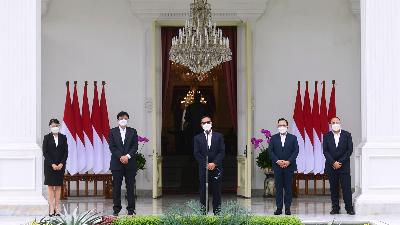
The Indonesia Investment Authority is set to merge with Danantara, but it still fails to optimize investments and faces ongoing issues with foreign investor confidence.

In the face of ambivalence, who is evil? It is those who choose greater evil or lesser evil.

Danantara will reduce the authority of the SOEs Minister. Transferring the management of major SOEs will make the Ministry almost powerless.
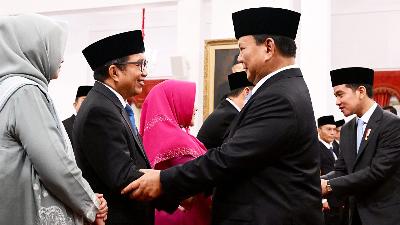
Prabowo Subianto is establishing BPI Danantara to manage state-owned enterprises. There are reportedly tug-of-wars and a number of obstacles in the process, including the obligation to revise laws.

A reader hopes that the government will do more when it comes to protecting citizens’ lives.

The move by President Prabowo Subianto to save Sritex could well lead to corruption. A smart strategy is needed to rescue collapsing companies.

The food estate project in Central Kalimantan turned into an oil palm plantation. The government failed to learn from the mistakes of the past.

Ridwan Kamil should have realized from the start that the parties supporting him were not being sincere. The people will lose out.
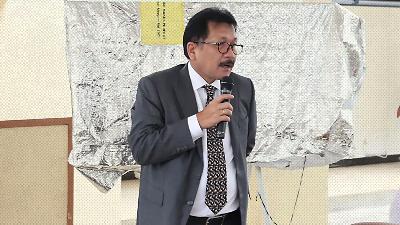
Judge bribery suspect Zarof Ricar was once a high-ranking Supreme Court official. He bankrolled a film about a judge.

The three judges who acquitted Ronald Tannur often reported for ethics violations. Their bank accounts show transactions amounting to the billions.
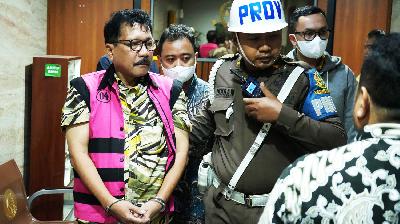
The Rp920 billion found in Zarof Ricar’s house is suspected of being related to arranging court case verdicts. The Corruption Eradication Commission once detected his corrupt exploits.

The food estate program, or rice field creation initiative in Central Kalimantan, was neglected and instead converted into oil palm plantations owned by private companies.

Prabowo Subianto orders four ministers to rescue the bankrupt textile company Sritex. A potential bailout from the state is on the table.

Interviews with Industry Minister Agus Gumiwang Kartasasmita and Sritex President Commissioner Iwan Setiawan Lukminto on the company’s bailout.

Cartoon: Yuyun Nurrachman

After Sritex, other major textile companies are also collapsing. Incentives and support are needed to curb imported goods.

Capital outflow becomes increasingly clear at the outset of Prabowo’s administration. The large cabinet undermines investors’ confidence.

Kamala Harris champions women’s legal and political rights, countering Donald Trump’s machismo.

Former Trade Minister Thomas Lembong is arrested by the Attorney General’s Office over corruption allegations. When will other ministers be questioned?

Prabowo Subianto is hoping to erase his sins in relation to the 1998 kidnappings. Gross human rights violations will not be a priority.

The obligation to obtain halal certification leads to higher economic costs and corruption. Labeling products that are non-halal would be more efficient.

Jokowi’s son-in-law, Bobby Nasution is caught up in alleged bribery involving a mining permit in North Maluku. He is accused of selling his influence.
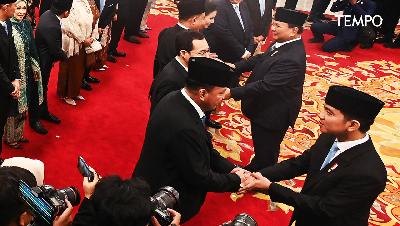
A number of problematic individuals are appointed to Prabowo Subianto’s cabinet. It will be difficult for the government to be effective in its first one or two years.
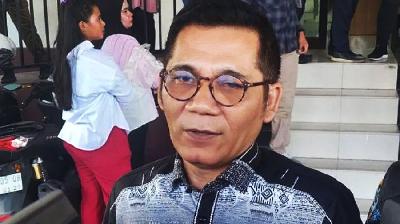
Former North Maluku Governor Abdul Gani Kasuba acknowledged meeting with Bobby Nasution but claimed he gained no advantage from it.
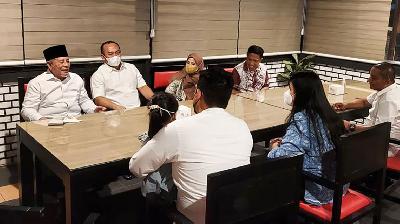
Bobby Nasution is suspected of managing the Medan Block nickel mine since 2021. He met with Abdul Gani Kasuba before becoming the Mayor of Medan.
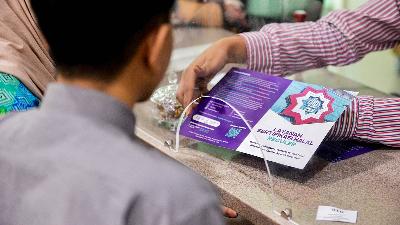
Entrepreneurs complain about the costly and complicated halal certification process. They must pay monthly fees for supervision.

Halal certification is slow due to inadequate supporting infrastructure. It has the potential to trigger a high-cost economy.

Entrepreneurs are pressured by the mandatory halal certification regulations. The costs associated with obtaining halal labels are considered expensive, and the procedures are complicated.

Three East Java gubernatorial candidates—Luluk, Khofifah, and Risma—talk about the competition in the 2024 regional head elections.
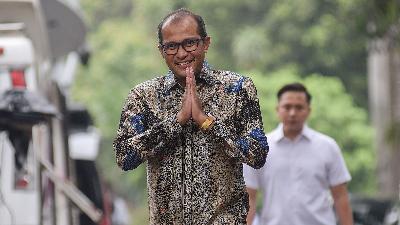
Prabowo Subianto appointed ministers and deputy ministers with problematic backgrounds in his cabinet. Several of them are closely associated with businessman Haji Isam.
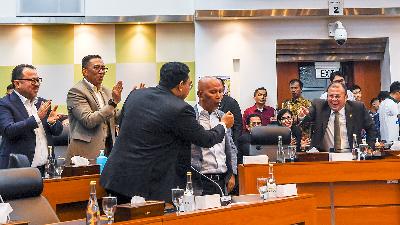
The PDI-P received the most positions as leaders of the DPR working bodies. Surya Paloh met with Bahlil Lahadalia to discuss the allocation of commission chairs.

The new ministries and agencies established by Prabowo Subianto cannot operate immediately. Some lack office space, have tight budgets, and are short on staff. The authority of the Haj and Umrah Organizing Agency even violates the law.

The rupiah is weakening amid the power transition, with global factors also exerting heavy pressure.

The phrase “human rights” was lost from Prabowo Subianto’s inauguration speech.

Food, like language, clothing, and customs, is a marker of our roots. Especially in the past.
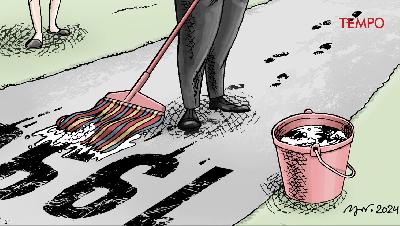
Cartoon: Yuyun Nurrachman
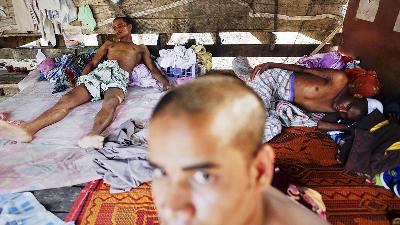
Rohingya refugees in Thailand, Malaysia, and the Philippines are treated differently than those in Indonesia.
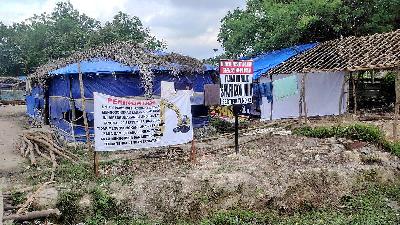
The Rohingya refugees living in Pekanbaru have more freedom to move around and reside in lodgings. Their children can also attend school.

Several Rohingya refugees successfully built their careers in various fields. They continued to work and raised awareness about the plight of displaced Rohingya refugees.
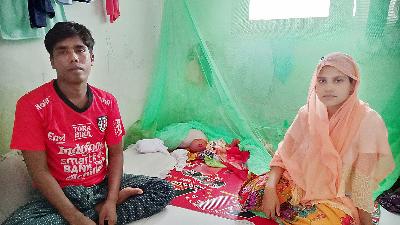
Rohingya refugees are still living in several inadequate temporary shelters in Aceh.

There are indications of problems with the IPO of Barito Renewables Energy. The stock exchange and capital markets authorities are neglecting their responsibilities.

The KPK should designate Sahbirin Noor a fugitive. There is a good chance the South Kalimantan Governor will go free.
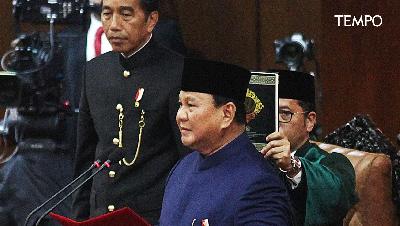
How did Prabowo Subianto decide on the composition of his cabinet? There are indications that several prospective ministers were proposed by tycoons.

Prabowo Subianto is inheriting an inefficient economy. Yet his new administration is likely to follow Jokowi’s economic model.
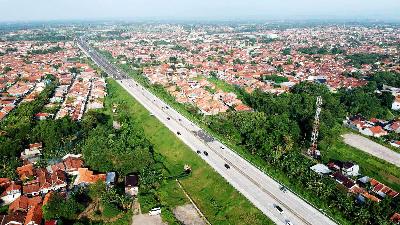
The Joko Widodo administration leaves a heavy burden for state-owned enterprises. Many projects result in big debts.

President Jokowi entrusted his confidants to join Prabowo’s cabinet. Several ‘volunteers’ also received positions.

Prabowo Subianto formed a large cabinet to accommodate the interests of parties, businessmen, and his supporters. Mining entrepreneur Haji Isam is suspected of proposing several ministerial candidates.
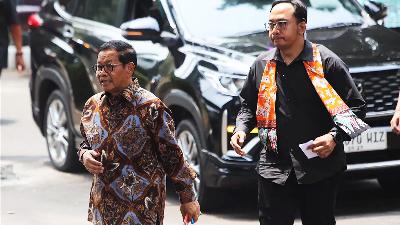
Megawati reportedly did not approve of PDI-P cadres entering Prabowo’s cabinet. She chose Pramono Anung to communicate with Prabowo.
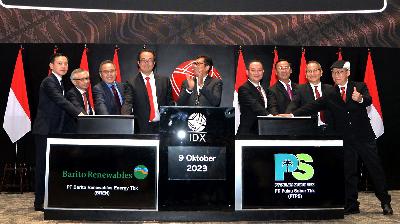
The Stock Exchange detects alleged violations in the IPO of Barito Renewables Energy. There are indications of maneuvering around public shareholding requirements.

Cartoon: Yuyun Nurrachman
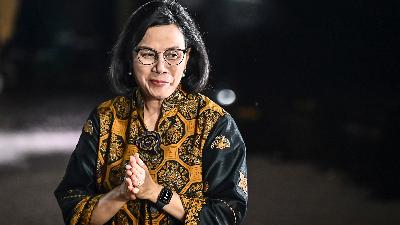
Sri Mulyani and several economic ministers from Jokowi join Prabowo’s cabinet, with encouragement from two former presidents.

Indonesia’s delegation at COP16 CBD in Cali, Colombia, is not led by a minister. Biodiversity funding is at risk of not being agreed upon.

South Kalimantan Governor Sahbirin Noor is suspected of receiving commissions on three projects in the e-catalog. He has not been seen since being named a suspect.
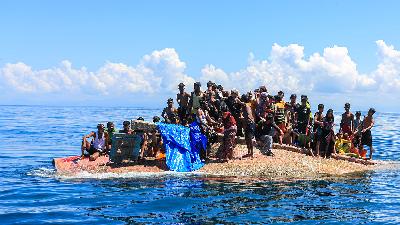
Uncertain future looms over Rohingya refugees in Indonesia. They are also struggling with various limitations.

Empathy is the key to happiness. We are happy when we help others, we are happy when we do good.

OJK’s right of reply and a remembrance to Mochtar Lubis who wrote about government.

The KPK uncovered alleged embezzlement of the Taspen pension fund involving Sinarmas Sekuritas. The result of poor supervision by the OJK.
Independent journalism needs public support. By subscribing to Tempo, you will contribute to our ongoing efforts to produce accurate, in-depth and reliable information. We believe that you and everyone else can make all the right decisions if you receive correct and complete information. For this reason, since its establishment on March 6, 1971, Tempo has been and will always be committed to hard-hitting investigative journalism. For the public and the Republic.